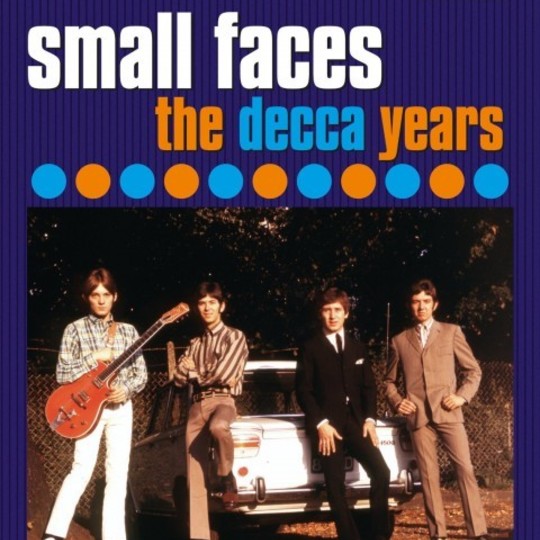"I have no ambition at all. I think this is possibly the worst thing about me" (Steve Marriott, 1966).
The Small Faces are often overlooked by musical historians. Which is a crying shame as their explosive collision of power chord driven pop and high energy soul undoubtedly paved the way for the Mod movement to grow from being an underground capital fad into a nationwide sensation.
Formed in 1965 by bass player Ronnie Lane and singer/guitarist Steve Marriott, original keyboard player Jimmy Winston and drummer Kenney Jones were recruited shortly after, and it wasn't long before management and record deals were penned too. For the next four years until Big Ben rang its final chimes of 1968 (Marriott quit the band during a New Year's Eve show that December) they were arguably the most forward thinking if occasionally volatile band on the planet.
The Decca Years traces the band's beginnings through to the band's parting of ways with both manager and label at the tail end of 1966. Spread across five CDs featuring 86 pieces of music and five interviews with singer Marriott, The Decca Years also includes a selection of colourful postcodes and a 72 page booklet-cum-magazine that examines the embryonic stages of their career step-by-step. Housed as a neatly packaged boxset, it compiles every single recording the band ever made for Decca alongside five BBC radio sessions recorded over a 12-month-period between the Augusts of 1965 and 1966. Also included is a CD of mainly demos, alternate takes and instrumentals that provides some insight into the Small Faces' creative process, particularly the backing track to 'I Can't Make It', their final acrimonious release for the label having come out three months after the band had parted ways with Decca.
At times that makes for a lot of duplication - albeit in various recorded guises - as both 'What'cha Gonna Do About It?' and 'Sha La La La Lee' feature on six occasions with 'Hey Girl' close behind on four. However, as a comprehensive document of the band's ever busy schedule, it ably demonstrates how their reputation as one of the hardest working bands from that era came about.
The first disc compiles their eight singles and b-sides for the label including controversial final release 'Patterns/E Too D', the band's final unauthorised (by the band) contractual obligation to Decca. By the time third single 'Sha La La La Lee' was released in January 1966, Ian McLagan had replaced Jimmy Winston on keyboards, completing the band's classic line-up. Their first and only number one 'All Or Nothing' came seven months later, and while the band's relationship with their label had already soured by that point, the seeds were sewn and they'd go on to become one of the most successful British acts of the decade. Five songs taken from various EPs including the original French release of 'Come On Children' make up the rest of the disc, which in total, amasses a pretty flawless representation of their initial output.
Discs two and three focus on the two albums released by Decca. Small Faces, their debut, which came out in May 1966 provides a snapshot of London in the 'Swinging Sixties'. Seven of the 12 songs that make up the record featured original keyboard player Winston, his replacement McLagan playing on the other five. Recorded between October 1965 and the following February, it still stands proud as a landmark release of its time. Something that can't really be said for the follow-up, From the Beginning. Issued by Decca six months after the band had left the label, its release possibly engineered as a spoiler for the band's first long player with Immediate Records which came out three weeks later. From the Beginning is essentially a hastily assembled compilation of previous singles, outtakes and rough demos recorded in the autumn of 1966 for a planned but never completed second Decca album.
The rarities and outtakes that make up disc four hint at some of The Small Faces' future destinations. 'Yesterday, Today And Tomorrow' and 'That Man' are the pick of the bunch, the former's winsome psychedelia paving the way for Pink Floyd et al the following year while the latter could easily have slotted onto 1968's concept album Ogdens' Nut Gone Flake. Elsewhere, the alternate take on 'E Too D' is barely recognisable to the original while instrumental demos of 'Show Me The Way' and 'All Our Yesterdays' suggest progress for what the band believed would be their second (but eventually ended up being their third) record was well underway.
The final disc of the set is also the most revealing. Revealing in the way it proficiently highlights The Small Faces as an incredible live band, interspersed with various interviews in which Steve Marriott revealingly talks about the band's beginnings, influences and reasons for eventually moving into the production side of the business. Covers of Mel Torme's 'Comin' Home Baby' and Sam Cooke's 'Shake' nestle side-by-side with incisive versions of more familiar numbers like 'Hey Girl' and 'You'd Better Believe It', never once dropping the pace or appearing to go through the motions. Indeed, of the five CDs, this one is probably the most essential if only to demonstrate its subjects live prowess.
Of course there are other Small Faces boxsets on the market and while The Decca Years is by no means a definitive anthology other than for the period in question, it's purpose by way of an introduction to one of the most influential bands of all time shouldn't be underestimated either.
-
8Dom Gourlay's Score
-
10User Score






















